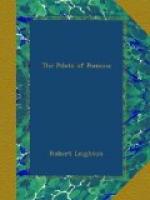When I got up in the morning and went on deck, the island of Hoy lay far to windward like a bank of mist upon the sea. We were far out on the broad Pentland Firth, plunging about on the rough water, with our mainsail double-reefed, and the flying jib pulling away like to split itself in the wind. I enjoyed it all for a time; but when I went below to help Jerry to get ready some breakfast for the skipper, the smell of the coffee and the frying bacon overcame me, and I was forced to go back to my bunk, where I remained for the rest of the day helplessly seasick.
The next morning, feeling better, I went up to get a breath of fresh air, and found that we were hemmed in by a thick white mist that crept round us, and rendered it difficult for Jerry, who was on the lookout at the bow, to determine our course. We were making for South Ronaldsay, and had been beating about all night, making very little headway; and when the mist lifted before noon, it was discovered that we had been driven down by the current, and had come nigh to running into the black rocks of Stroma Island.
Here, where two strong streams met with terrific force, the turbulent water whirled about with wild irregular motion, and we were swept now one way, now another, until it seemed useless to fight against the current that controlled us. We were, in fact, in the midst of that dangerous vortex locally known as the Swelkie. Those who know the secrets of the ocean currents of the northern seas have their own scientific explanations to give; but our native boatmen and sailors, who were not so well acquainted with the eccentricities of the Gulf stream as with the popular legends of Orkney, accounted for the Swelkie in this way:
A certain King Frodi had a magical quern, or hand mill, called Grotti; the largest quern ever known in Denmark. Now Grotti, which ground either gold or peace for King Frodi as he willed, was stolen by a sea king named Mysing, who set the mill to grind white salt for his ships. But it happened that Mysing had only learned the spell to set the mill going, and knew not how to stop it. His ships, therefore, became so full of salt that they sank, and Grotti with them, before they could reach the islands of Orkney; hence the Swelkie. This took place to the northwest of Stroma Island, and ever since the sea there has not rested, for as the water falls through the eye of the quern, it roars and rushes about, and the quern goes on grinding and grinding salt, and giving its saltness to the whole ocean.
The mist having lifted, Captain Flett had a reef or two let out, and himself took the helm until he got us into calmer water, when we luffed to the windward and headed for South Ronaldsay, with a stiff breeze springing up that gave us a clear seaway to get past the Lother Reef, when we sailed steadily through a lesser rush of tide across a quiet, landlocked sea, into the little haven of Burwick, where in the gathering darkness the chain went rattling down, and we came to a restful anchorage.




